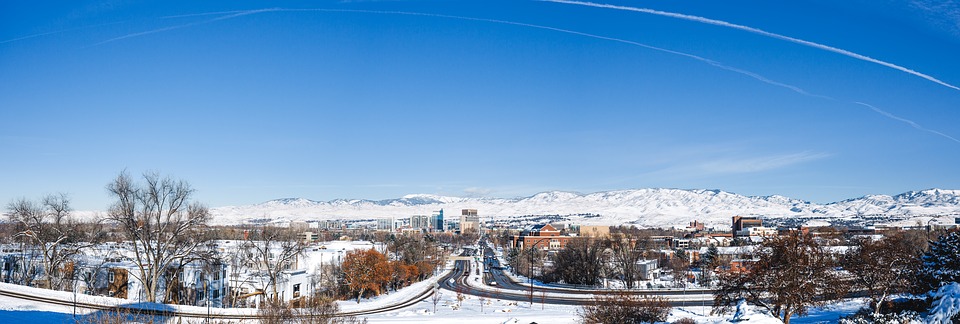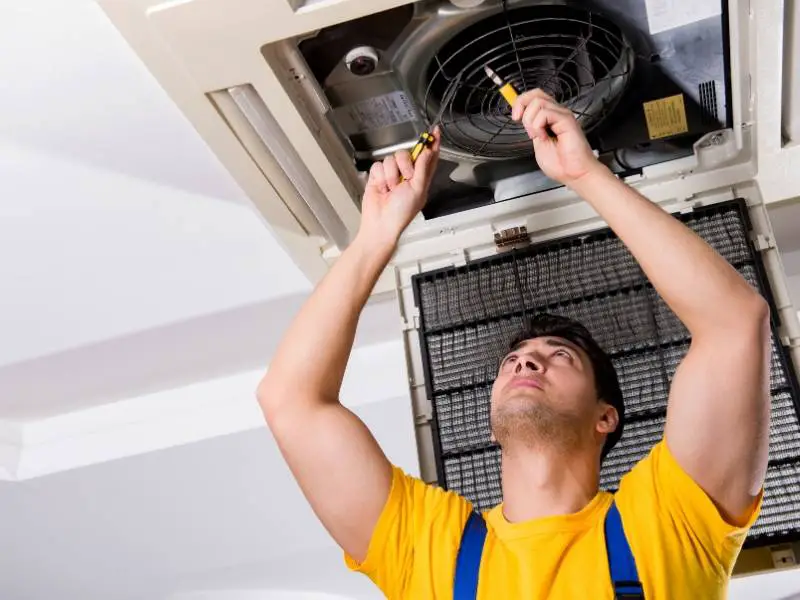Do you live in Idaho and are trying to make a career in the trades? HVAC is a great career option if you like the mechanical industry.
The Bureau of Labor Statistics projects that the HVAC field will grow by 21% from 2012-2022. The industry is witnessing a massive job growth nationwide. There were 267,600 HVAC jobs back in 2012 and 55,900 more are expected to be added by 2022. This kind of growth makes an HVAC career secure and lucrative.
In Idaho, experienced HVAC Technicians earn a median hourly wage of $17.89. Hourly wages typically start from $10.51 and go up to $28.61. HVAC Technicians earn a median salary of $37,220 per year. Salaries typically start from $21,860 and go up to $59,500.
In this article, we will discuss the process of licensing for HVAC professionals in Idaho.

Licensing
HVAC professionals in Idaho must be licensed with the Idaho Division of Building Safety. The state has six types of licensing based on the experience and skills of the applicants. Though the state of Idaho has a reciprocal licensing arrangement with some states for electrical and plumbing trades, it does not have any such arrangement for HVAC trade.
Licensing Requirements For Each Category
HVAC Apprentice
To qualify to register as a HVAC apprentice, the applicant must:
- be employed by a licensed HVAC contractor and work under the supervision of a licensed HVAC journeyman for four years
- complete a training program related to mechanical engineering and the principles of thermodynamics
Registration as an HVAC Apprentice is valid for five years. Apprentice Registration is not the same as a license or certificate of competency. It does not imply the applicant’s level of competence. The license registration fee is $50.
HVAC Specialty Apprentice
To qualify to register as a Specialty Apprentice, the applicant must:
- be employed by a licensed HVAC Specialty Contractor and work under the supervision of an HVAC Specialty Journeyman of the same specialty category
- complete a related training course

HVAC Specialty Apprentice registration is valid for two years. Like the general apprentice registration, specialty apprentice registration isn’t a license or certificate of competency. It does not imply the applicant’s level of competence.
License registration fee: $20
HVAC Journeyman
To qualify for an HVAC Journeyman’s license, the applicant must meet certain requirements:
- they must be employed by for a minimum of four years;
- or be a registered HVAC apprentice making HVAC installations on the job under the supervision of a qualified HVAC journeyman having completed four years of approved HVAC apprenticeship school.
Out-of-State applicants can submit a license issued by another recognized jurisdiction as a proof of meeting the experience.
A technician who has never been previously licensed a journeyman and hasn’t worked in a recognized jurisdiction must have four years of HVAC work experience. That work must be at least on the level of what an HVAC apprentice performs in Idaho. The requirement of four years of apprenticeship school also applies.
Alternatively, the technician may have eight years of HVAC work experience. A year of work is considered 2000 hours. That means you need a minimum of 16,000 hours work experience to qualify by this method.
Application fee: $35
HVAC Specialty Journeyman
The HVAC Specialty Journeyman licensing is available for four specialties:
- Hearth
- Fuel Gas Piping
- Waste Oil Heating
- LP Limited Heating
To qualify for a Specialty Journeyman’s license, the technician must have a minimum of one year of work experience (two years of work experience if applying in LP Limited Heating) within the scope of the specialty.
In addition, the technician must complete an approved training course with a minimum of 60 hours of education in the specialty (120 hours if the specialty is LP Limited Heating) or pass the Idaho exam for the specialties.
Application fee: $35

HVAC Contractor
To qualify for the HVAC Contractor exam the applicant must:
- have a minimum of two years of experience as an HVAC Journeyman in Idaho or another jurisdiction
- submit a $2,000 Compliance Bond in the name of the company
Application fee: $35
HVAC Specialty Contractor
To qualify for the HVAC Specialty Contractor exam, the applicant must:
- have a minimum of two years of experience as an HVAC Specialty Journeyman in his or her chosen specialty in Idaho (or another jurisdiction),
- and submit a $2,000 Compliance Bond in the name of the company.
Applicants having Idaho HVAC Specialty Journeyman license can submit it as a proof of experience.
Out-of-state applicants must provide a notarized Employer’s Verification Form(s) showing that the applicant has a minimum of two years of experience as an HVAC Specialty Journeyman in their specialty.
Application fee: $35
Application forms for all categories can be downloaded from Idaho Division of Building Society’s website.
Examination Process
Once you’ve submitted your application and it’s been accepted, the Division of Building Safety will let you know the exam date for the license.
The Journeyman and Specialty Journeyman license exams have 120 questions and a time limit of 4 hours. Applicants must score 70% to pass.
The subjects covered in exams are:
- Scope and Administration
- Definitions
- General Regulations
- Ventilation
- Exhaust Systems
- Duct Systems
- Chimneys and Vents
- Specific Appliances, Fireplaces, and Solid Fuel-Burning Equipment
- Boilers, Water Heaters, and Pressure Vessels
- Refrigeration
- Hydronic Piping
- Fuel Oil Piping Storage
- Solar Systems
- International Fuel Gas Code (IFGC)
- Gas Piping Installations
- Gaseous Hydrogen Systems
- Sizing and Drawings
- Idaho HVAC Statutes and Rules
The Contractor and Specialty Contractor exams have 110 questions and a time limit of 4 hours. Applicants must score 70% to pass. These are open-book exams.
Here are the recommended study materials for preparation and reference:
- International Fuel Gas Code, 2012
- International Mechanical Code, 2012
- Idaho Contractors Business and Law Reference Manual
- Idaho HVAC Statutes and Rules
Check out our guide to important HVAC reference works as well as our practice tests.
EPA Requirements

Section 608 of the Federal Clean Air Act requires all persons who work with regulated refrigerants be certified in refrigerant handling techniques by passing the Environmental Protection Agency 608 Technician Certification exam.
This certification is mandatory across the country. You can check our previous article for more details about EPA Certification.
Conclusion
Idaho offers a great career opportunity for HVAC professionals. However, the state requires them to be registered or licensed under appropriate categories. The process is simple and straightforward.
They can register or be licensed as Apprentice, Journeyman or Contractor with and also specialize in a particular area of HVAC. We hope this article helps set you on the right path to a prosperous HVAC career in the Gem State!
Looking For Information On Nearby States?
You might also be interested in HVAC licensing requirements in bordering states:

